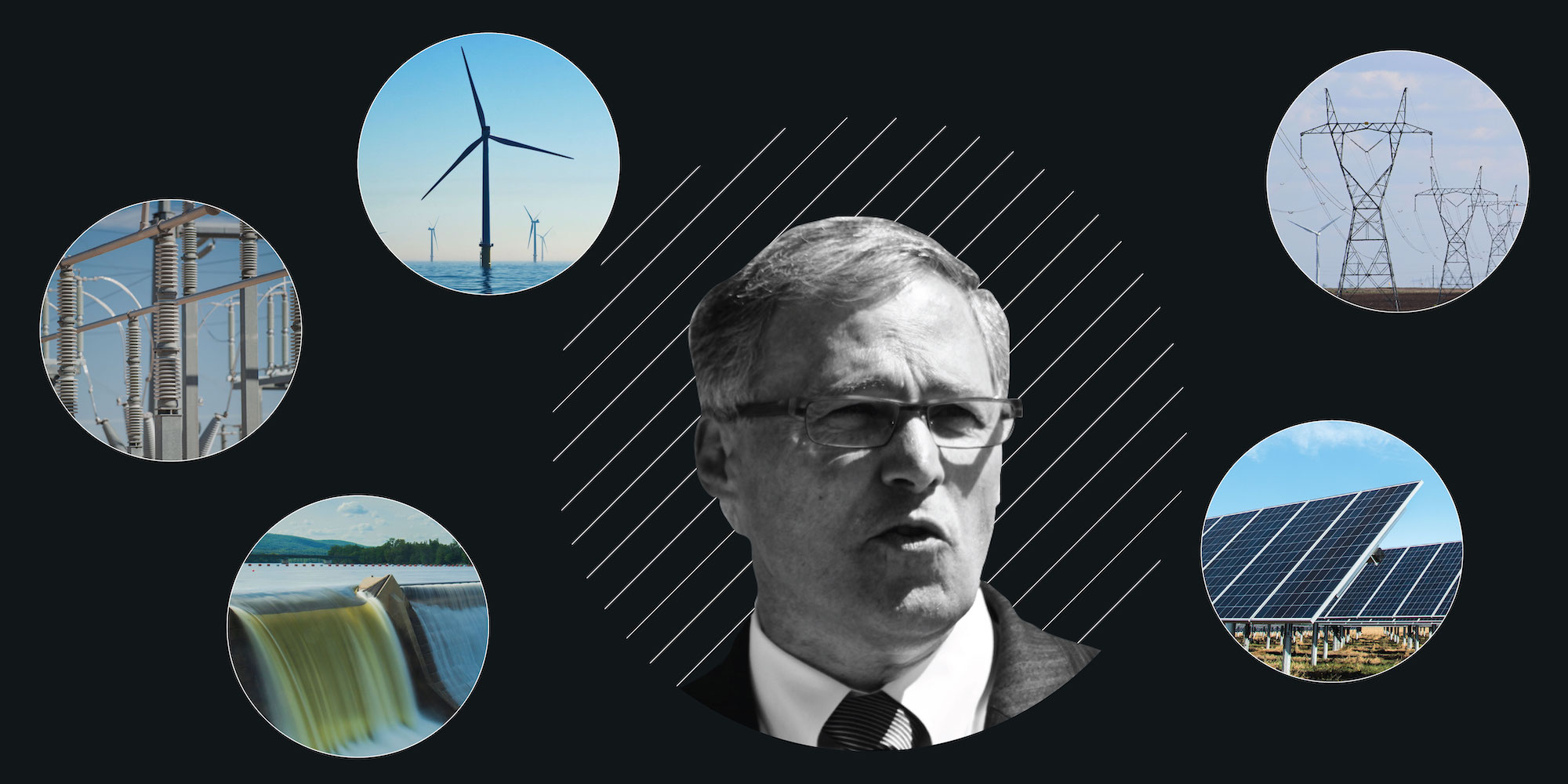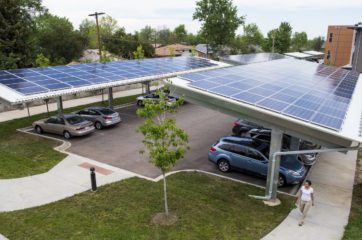Washington Governor Jay Inslee is running for president as the indisputable climate change candidate. He recently made headlines for challenging the Democratic National Convention to host a climate debate, and his campaign has been rolling out sweeping and ambitious climate proposals since its inception.
Yesterday morning, he introduced his newest, most comprehensive climate plan, entitled “Freedom from Fossil Fuels: A Plan to End Corporate Welfare, Hold Polluters Accountable and Transition the US Economy Off of Fossil Fuels.” It calls for a complete and total end to our dangerous reliance on fossil fuels in the US, and outlines the necessary steps the country must take to achieve such an ambitious vision. These include implementing a nationwide fracking prohibition, ending all governmental fossil fuel subsidies, and levying a rising fee on carbon pollution.
The 27-page Freedom from Fossil Fuels plan is the fourth installation in Inslee’s series of complementary proposals. Previously, as part of his 100% Clean Energy for America Plan, the Governor proposed to completely decarbonize electricity, as well as new cars and buildings. Subsequently, in his Evergreen Economy plan, he outlined a 10-year investment proposal that allocates more than $9 trillion to clean energy, sustainable infrastructure, and other climate mitigation strategies. Several more plans are supposed to be released in the coming weeks.
What’s in the Freedom from Fossil Fuels Plan
Yesterday’s proposal is probably Inslee’s most ambitious to date. Freedom From Fossil Fuels includes five main provisions that broadly lay out the necessary steps the country must take in order to effectively transition away from fossil fuels.
1. Ending fossil fuel subsidies
Each year, the US government provides more than $26 billion in direct support for fossil fuel companies, while many polluters continue to rake in record profits. In the face of an unprecedented climate crisis, it makes very little sense that American taxpayers are funding oil and gas companies like ExxonMobil, which earned $57 million per day in 2018 according to Inslee’s proposal. So how do we effectively end the fossil fuel subsidies that have only grown in the years since Donald Trump has taken office?
Inslee outlines a couple of initial ideas to tackle this issue, including:
- Closing fossil fuel tax loopholes by passing legislation that repeals a myriad of deductions and exemptions that never made much sense to begin with.
- Recouping appropriate payments for fossil fuel extraction – the current administration has been practically giving away America’s public lands to oil companies, by giving them royalty exemptions and low-cost, non-competitive lease prices.
- Ending institutional federal support for fossil fuels by doing things like ending US financing for overseas fossil fuel projects and transforming the Department of Energy Office of Fossil Energy into the Office of Industrial Decarbonization.
Oil, gas and coal companies do not need financial support from everyday Americans.
2. Banning Federal Leasing and Phasing Out Fossil-Fuel Production
The US now ranks as the world’s largest oil and gas producer, as the Trump administration has expanded production by opening up more federal lands for oil and gas drilling, and shrinking the borders of national monuments. This plan reverses the current federal stance, protects public lands, and puts an end to new fossil fuel projects.
In order to achieve this, Inslee outlines a number of actions he will take as president, including:
- Issuing an executive order to ban all new fossil fuel leasing on federal lands and waters on his first day in office.
- Directing federal agencies to use all of their existing authority to cancel or deny the extensions of current fossil fuel leases.
- Asking Congress to work on implementing a ban of fossil fuel leasing on public land to ensure protections last beyond just one administration.
- Establishing a Presidential Commission on Energy Transition, which will focus on ensuring a just transition for communities that rely on fossil fuel extraction.
- Pushing forward a suite of executive and legislative policies to restrict fossil fuel production on non-public lands, including through: mandatory setbacks from private property, bans on particularly destructive production practices, and buying out and decommissioning existing fossil fuel facilities.
- Providing a just transition and new opportunities for fossil fuel workers and communities by ensuring retirement benefits.
- Fully ban fracking. Under Inslee’s leadership, Washington State effectively banned fracking last month, and the federal measure would likely mimic that prohibition.
3. Holding polluters accountable
Inslee’s plan also establishes a Climate Pollution Fee — a much-anticipated price on carbon emissions. Washington State has attempted to pass carbon pricing twice, ultimately failing at the ballot, but Inslee has always been a major supporter of the policy. It’s no surprise then, that his Freedom from Fossil Fuels plan includes a carbon pollution pricing component. As carbon pricing continues to gain traction across the country at the state level, Inslee’s inclusion of it in his federal proposal is a good sign for state-level movements.
While some of the nitty-gritty details of this fee are not delineated in this initial draft, here’s what we do know. The fee will:
- Apply to the economic sectors where it will have the most effective impact. That’s a pretty vague claim, although research has shown the electric sector is where carbon pricing would have the most immediately impact. Based on the current language, it’s unclear if the fee will ultimately be applied across all economic sectors.
- Initially be set low and increase steadily and aggressively over time. No specific price is listed, but given Inslee’s strong track record on climate action and willingness to end the country’s reliance on fossil fuels altogether, it’s fair to say the price point will be sufficiently high to adhere to the kinds of emission reduction goals scientists are calling for.
- Be reexamined biannually in its price, scope of coverage and efficacy.
- Be assessed as far upstream as possible.
- Apply to all greenhouse gases, not just carbon. That includes methane, F-gases, and other harmful pollutants.
- Invest generated revenue in frontline and low-income communities, rather than returning revenue back to individuals. That’s particularly notable given the fact that the current leading federal carbon pricing proposal, the Energy Innovation and Carbon Dividend Act (HR 763), is revenue neutral. While conservatives are typically more likely to support revenue neutral carbon pricing legislation, environmental justice groups have expressed their opposition to bills that don’t explicitly invest in vulnerable communities.
- Impose a “Carbon Duty”, effectively a carbon border fee, on products that are imported from nations that are not committed to the implementation of strong climate pollution reduction goals. This will be done in order to protect America’s energy-intensive companies and reward environmental innovation.
It’s encouraging that Gov. Inslee continues to highlight the importance of carbon pricing as a central tenet of any federal climate policy despite the political obstacles he has faced in his state. Keep your eye on this component of this proposal, as it is the most likely to gain bipartisan support.
4. Rejecting new fossil fuel infrastructure
Further investing in fossil fuel infrastructure is contrary to the scientific consensus around the dangers of carbon pollution. To avoid stranded assets and further economic disruption in the future, the US needs to stop building new fossil fuel infrastructure.
To make that happen, Inslee calls for the following:
- Requiring all proposed infrastructure projects to pass a “Climate Test”, and meet certain climate standards in adherence to the administration’s goals
- Respecting local, state, and tribal authorities and empowering communities to reject fossil fuel infrastructure that harms their communities and environment.
- Stopping fossil fuel exports, by 1) reinstating the Crude Oil Export Ban, which was lifted by Congress in 2015 and 2) establishing similar restrictions for the exports of other fossil fuels.
5. Improving corporate climate transparency
Climate change, in the form of extreme weather patterns and increased natural disasters, will bring about massive changes to the world’s economy. In order to prevent major shocks to the financial system, Inslee’s proposal asserts that the US government must create a pathway for companies to transition away from fossil fuel holdings with adequate speed and scale. Inslee proposes:
- Appointing Security & Exchange Commission (SEC) officials to focus on enforcement action and corporate disclosure of climate risk.
- Establishing stricter SEC standards on the disclosure of corporate fossil fuel holdings, deforestation-related investments, and greenhouse gas targets.
- Having federal climate change experts assist credit rating agencies to educate them on the physical and financial risks climate change presents to companies’ investment holdings.
- Advocating for the Federal Reserve to join the International Network on Greening the Financial System.
Despite early poll numbers, this really matters
Inslee has been considered by many a long-shot candidate, but he has put forward the most comprehensive climate action plan so far, and that matters, especially in an election where this will be a top issue. It is also important to note that polls conducted this early in the campaign are not sure-fire indicators of what will actually happen. At this point in the 2016 presidential race, former Florida Gov. Jeb Bush was leading the pack among GOP candidates, while Donald Trump polled at 1%, according to an NBC/WSJ poll. We all know what happened there.
Therefore, there’s no reason to count out a potentially strong candidate like Inslee. He has extensive gubernatorial experience in one of the wealthiest and most socially progressive states in the country, and a clear, focused message centered around the most pressing issue of our time. (That’s not my hot take – in an April CNN poll, climate change was ranked as the single most important issue to Democratic primary voters.)
Furthermore, even if Inslee doesn’t stand a significant chance at the White House, his über-specific, visionary proposals matter. Since the Green New Deal was first introduced by Rep. Alexandria Ocasio-Cortez (D) and Sen. Ed Markey (D) in February, it’s been hailed by many as a big, bold transformation of the economy. At the same time, it’s important to note that the GND is a non-binding resolution, a framework, not a detailed plan for addressing climate change.
Gov. Inslee is now systematically creating a much-needed policy package that adheres to the goals of the GND, while outlining very specific and tangible actions that should be taken to achieve them. If the 2020 campaign takes a turn and Inslee is elected president, we have every reason to think he’ll do everything in his power to push forward these exhaustive proposals. And if he’s not? Well, he’ll leave behind a pretty darn-good outline of a GND-style policy package for whoever is elected to follow.
Furthermore, carbon pricing, which has long been touted as a bipartisan solution with widespread support among economists, is a critical component of that package. With state and federal carbon pricing efforts gaining momentum, it’s notable that a climate champion like Inslee has opted to keep carbon pricing at the forefront of the climate conversation.
Some will call this plan radical, but it’s really not. It matches the urgency of the climate crisis, and speaks to the bold action needed to address it and prevent its worst effects. The way we have been so insufficiently addressing climate change over the last few years is radical, and frankly, shocking. At the very least, the Freedom from Fossil Fuels plan will inspire other candidates to step up their game and present climate legislation that is as ambitious and sweeping as Inslee’s. And at the most? It will be the beginning of the end for fossil fuels in this country.
Stay tuned for a special Climate XChange report on different presidential candidates climate policy proposals, and for continued coverage on federal and state carbon pricing efforts.









